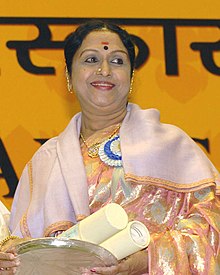
Villupuram Chinnaiya Manrayar Ganesamoorthy, better known by his stage name Sivaji Ganesan, was an Indian actor and film producer. He was mainly active in Tamil cinema during the latter half of the 20th century. Sivaji Ganesan is acknowledged as one of the greatest Indian actors of all time and among the most imitated one by other actors. He was known for his versatility and the variety of roles he depicted on screen, which also gave him the Tamil nickname Nadigar Thilagam. In a career that spanned close to five decades, he had acted in 288 films in Tamil, Telugu, Kannada, Malayalam and Hindi. Sivaji Ganesan is the only actor in Tamil cinema to have played the lead role in over 250 films.

Ramasamy Ganesan, better known by his stage name Gemini Ganesan, was an Indian actor who worked mainly in Tamil cinema. He was referred as Kaadhal Mannan for his romantic roles in films. Ganesan was one of the "three biggest names of Tamil cinema", the other two being M. G. Ramachandran and Sivaji Ganesan. While Sivaji Ganesan excelled in dramatic films and M. G. Ramachandran was popular as an action hero, Gemini Ganesan was known for his romantic films. A recipient of the Padma Shri in 1971, he had also won several other awards including the Kalaimamani, the MGR Gold Medal, and the Screen Lifetime Achievement Award. He was one of the few college graduates to enter the film industry then.

Nissankara Savitri was an Indian actress and filmmaker who predominantly worked in Telugu and Tamil films. Widely regarded as one of the greatest actresses in the history of Indian cinema, she was popularly known by the epithets Mahanati in Telugu and Nadigaiyar Thilagam in Tamil. Savitri was among the highest-paid and most sought-after actresses in South Indian cinema during the 1950s and 1960s.

Vyjayanthimala Bali, known mononymously as Vyjayanthimala, is an Indian parliamentarian, dancer and former actress. Regarded as one of Hindi cinema's finest actresses and dancers, she is the recipient of several accolades, including five Filmfare Awards and two BFJA Awards. Considered the first female superstar of Indian Cinema, she made her screen debut at the age of 16 with the Tamil film Vaazhkai (1949), and followed this with a role in the Telugu film Jeevitham (1950). Her first work in Hindi cinema was the social guidance film Bahar (1951), which she headlined, and achieved her breakthrough with the romance Nagin (1954).

Vanisri is an Indian actress known for her works predominantly in Telugu, Tamil, and Kannada films. In a film career spanning 40 years, she has received three Filmfare Awards South, the Nandi Awards and the Tamil Nadu State Film Award.
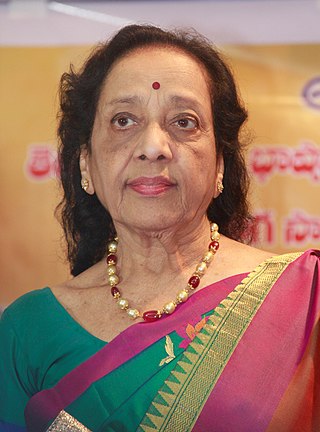
Jamuna was an Indian actress, director, and politician who appeared mainly in Telugu cinema. She made her acting debut at age 16 in Dr. Garikapati Rajarao's Puttillu (1953), and received her breakthrough with L. V. Prasad'sMissamma (1955). Her filmography also includes Tamil, Kannada, and Hindi films. She won a Filmfare Award and an award at Filmfare Awards South. She was a member of parliament in the 9th Lok Sabha (1989–1991) representing the Rajahmundry constituency.

Vasundhara Devi, known by her stage name Kanchana, is an Indian actress who primarily worked in Telugu, Tamil, and Kannada films, in addition to Malayalam and Hindi films.

Avichi Meiyappa Chettiar, also known as A. V. Meiyappan, A. V. Meiyappa Chettiar or AVM, was an Indian film producer, film director and screenwriter who established AVM Productions in Vadapalani, Chennai. He is widely regarded as one of the pioneers of Tamil cinema, and one of three movie moguls of the South Indian film industry along with S. S. Vasan and L. V. Prasad. His production company AVM Productions is the only production company in Kollywood to run successfully for five decades and three generations.

Sankaramanchi Janaki, widely known as Sowcar Janaki, is an Indian actress known for her works in Tamil, Telugu, Malayalam and Kannada language films. In a career spanning over seven decades Janaki has appeared in close to over 390 films. She also performed on stage in over 300 shows and was a radio artist during her earlier years. She is the recipient of two Nandi Awards, a Kalaimamani and India's fourth-highest civilian award Padma Shri. Her younger sister, Krishna Kumari, was also a noted actress.
Bharathi Vishnuvardhan, also known mononymously as Bharathi, is an Indian actress known primarily for her work in Kannada cinema and television serials. She began her career in 1966, as a lead actress, with the Kannada movie Love in Bangalore though Dudde Doddappa was her first release. In a career spanning over 50 years, Bharathi has appeared in 150 films. Apart from 100 films in Kannada, she has also acted in a handful of Hindi, Tamil, Telugu and Malayalam films. Through the course of her career, she became known for her portrayal of roles of mythological and historical characters, and also that of a student, a romantic and a rural belle. Her role in Sri Krishnadevaraya (1970) as Chennambike won her the Karnataka State Film Award for Best Actress. In 2017, she was honoured with the Padma Shri by the Government of India. She has the distinction of having paired with Dr.Rajkumar as a lead actress in all the 26 movies she acted with him and is also paired with him the most no. of times in those movies where he played multiple roles.

Devika Devadoss was an Indian actress who worked in Tamil and Telugu along with a few Malayalam, Kannada, and Hindi films. She was one of the popular lead actresses in the 1960s.
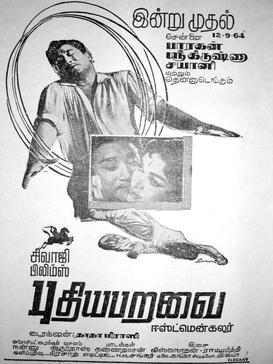
Puthiya Paravai is a 1964 Indian Tamil-language romantic thriller film directed by Dada Mirasi. Produced by Sivaji Ganesan, the film stars himself, B. Saroja Devi, M. R. Radha and Sowcar Janaki, with Nagesh, Manorama, V. K. Ramasamy, O. A. K. Thevar and S. V. Ramadas in supporting roles. The plot revolves around Gopal, who falls in love with Latha, when his previously presumed-dead wife Chitra arrives. He claims her to be an impostor but no one believes him.
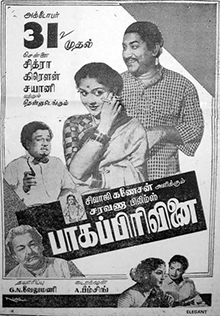
Bhaaga Pirivinai is a 1959 Indian Tamil-language drama film directed by A. Bhimsingh, starring Sivaji Ganesan, M. R. Radha and B. Saroja Devi. The film was released on 31 October 1959. It was remade in Hindi as Khandan (1965), in Telugu as Kalasi Vunte Kaladu Sukham (1961), in Kannada as Muriyada Mane (1964), and in Malayalam as Nirakudam (1977).
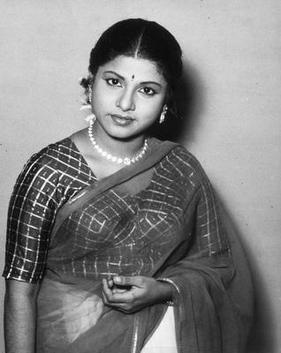
M. Saroja was an Indian actress and comedian who worked in Tamil cinema. She was frequently paired alongside K. A. Thangavelu.
Madurai Narasimha Achary Rajam is an Indian actress, who works mainly in Tamil cinema. She made her stage acting debut at the age of seven, and film acting debut as a child artist in 1949. Rajam played the vamp role in the Tamil classic Ratha Kanneer (1954), opposite M. R. Radha. Since then Rajam had acted with several leading actors including MGR, Sivaji Ganesan, Gemini Ganesan, M. R. Radha, S.S. Rajendran, M. N. Nambiar and N. S. Krishnan. She married popular Tamil playback singer A. L. Raghavan on 2 May 1960. Her performances in films like, Rathak Kaneer, Pennin Perumai, Pudhayal, Thanga Padumai, "Nadodi Mannan", "Pasa Malar", Thaali Bhagyam and "Arangetram" were critically acclaimed. She played supporting roles in films since 1970 to 1990. She started working in TV serials from 1995 and continues to work in films till 2014. In 1958 Rajam was booked by M. G. Ramachandran for his second directorial venture Ponniyin Selvan. One of the first screen adaptations of Kalki Krishnamurthy's Ponniyin Selvan, the film had a huge ensemble cast consisting of Vyjayanthimala, Savitri, Gemini Ganesan, Padmini, Saroja Devi and Nagesh.. In the film, she was given the role of Nandhini, the wife of Periya Pazhuvettaraiyar. However, in mid-1958 the film was shelved for unknown reasons.

Vidivelli is a 1960 Indian Tamil-language film written and directed by C. V. Sridhar. The film stars Sivaji Ganesan, B. Saroja Devi and M. N. Rajam; Ganesan also produced it under Prabhuram Pictures, a subsidiary of his own company Sivaji Films. The film focuses on a brother who steals a diamond necklace for his sister's happy life. But the necklace itself becomes a problem. The rest of the story deals with what is the secret of the necklace and how the brother solves this puzzle.
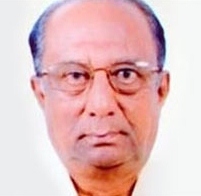
A. Jagannathan was an Indian film director who worked in the Tamil, Telugu, Kannada and Hindi film industries and he was introduced by R.M. Veerappan in his Sathya Movies banner for Manipayal. He directed nearly 50 films in Tamil.
Lakshmanan Vijayalakshmi is an Indian actress and classical dancer whose career was from 1959 to 1969. She appeared in Malayalam, Tamil, Kannada, Telugu and Hindi films.

Iruvar Ullam is a 1963 Indian Tamil-language romance film, directed by L. V. Prasad and written by M. Karunanidhi. Based on Lakshmi's novel Pen Manam, the film stars Sivaji Ganesan and B. Saroja Devi, while M. R. Radha, S. V. Ranga Rao, T. R. Ramachandran, T. P. Muthulakshmi, Sandhya and Padmini Priyadarshini play supporting roles.
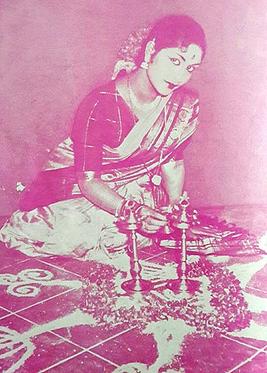
K. R. Indira Devi (1949–2017) was an Indian actress who was active in Tamil Cinema during the latter half of the 20th century. She was well known for her supporting roles, but was also a successful dubbing artist. In a career spanning close to five decades, she acted in more than 250 films in the Tamil, Telugu, Kannada and Malayalam. Indira debuted as heroine in Konjum Kumari (1963). She was awarded the Kalaimamani by Government of Tamil Nadu.
